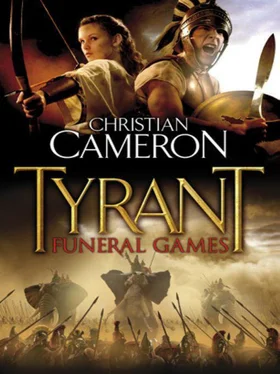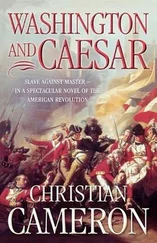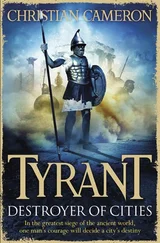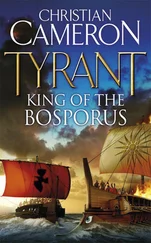Christian Cameron - Funeral Games
Здесь есть возможность читать онлайн «Christian Cameron - Funeral Games» весь текст электронной книги совершенно бесплатно (целиком полную версию без сокращений). В некоторых случаях можно слушать аудио, скачать через торрент в формате fb2 и присутствует краткое содержание. Жанр: Исторические приключения, на английском языке. Описание произведения, (предисловие) а так же отзывы посетителей доступны на портале библиотеки ЛибКат.
- Название:Funeral Games
- Автор:
- Жанр:
- Год:неизвестен
- ISBN:нет данных
- Рейтинг книги:5 / 5. Голосов: 1
-
Избранное:Добавить в избранное
- Отзывы:
-
Ваша оценка:
- 100
- 1
- 2
- 3
- 4
- 5
Funeral Games: краткое содержание, описание и аннотация
Предлагаем к чтению аннотацию, описание, краткое содержание или предисловие (зависит от того, что написал сам автор книги «Funeral Games»). Если вы не нашли необходимую информацию о книге — напишите в комментариях, мы постараемся отыскать её.
Funeral Games — читать онлайн бесплатно полную книгу (весь текст) целиком
Ниже представлен текст книги, разбитый по страницам. Система сохранения места последней прочитанной страницы, позволяет с удобством читать онлайн бесплатно книгу «Funeral Games», без необходимости каждый раз заново искать на чём Вы остановились. Поставьте закладку, и сможете в любой момент перейти на страницу, на которой закончили чтение.
Интервал:
Закладка:
Melitta was looking at the eastern horizon as if following her dead father’s hand. The town sat on a bluff, and she could see a parasang, thirty full stades, or more in the early afternoon sun. ‘Is that smoke?’ she asked.
Philokles looked under his hand, and so did Satyrus.
‘I expect they’re clearing new fields,’ Satyrus said. He regretted his tone almost at once – hectoring his sister with a display of knowledge when he didn’t actually know what he was talking about. I must outgrow that, he thought.
She glanced at him and gave him half a smile, as if she could hear every word of his interior dialogue. ‘Leon’s still away,’ she said, indicating the empty wharves as they rode through the gates.
‘Leon the Numidian is our richest citizen,’ Philokles said to Theron, who was more interested in mastering his horse than in the town’s social life. ‘Married to a barbarian. Wonderful horseman. A well-rounded man, for all that he started life as a slave.’
‘Even in Corinth I’ve heard of your Leon,’ Theron said. ‘Whoa!’
‘It will do you no good to lose your temper at a horse,’ Melitta said. She laid a hand on Theron’s bridle and stroked his gelding’s neck and the horse calmed. ‘That’s quite a squadron for this time of year,’ she said, pointing out to sea.
Satyrus looked. At first he saw nothing, but after a moment he could see a line of sails just nicking the edge of the world, three or four hours out in the bay. ‘Triremes,’ he said, because the sails were matching sizes. Closer in, a pentekonter raced for the beach under full oars.
‘Is that mama’s boat?’ Satyrus asked. He was relieved to see it.
‘Early for our mother,’ Melitta said. But she smiled. They both wanted her home.
Theron glanced at her and looked away, changing weight and sitting too far back on his horse. The horse sensed his inattention and decided to be rid of him. He half-reared and then shot forward and Theron landed on the road like a sack of barley. The gelding raced away.
‘Oof,’ he said. Then he lay still.
Satyrus put a hand on his borrowed straw hat and leaned forward, the change of his weight enough to push Thalassa into a gallop, and he raced across a field of new emmer wheat that rolled away to the east, broken only by boundary walls and the line of the road. He caught the gelding easily, turned Thalassa under the offending horse’s nose and caught his dangling reins. ‘Come on, Hermes,’ he said. Hermes was a gelding who missed his prick and tended to take it out on his riders. Satyrus stood up on Thalassa’s back and jumped on to the gelding, pulled the reins and began speaking a litany of nonsense to him. The gelding turned and trotted back to the group, and Thalassa followed along, riderless but obedient.
When he was within range of her voice, Melitta called out, ‘Can you handle him?’ just to annoy her brother, who responded by prodding the gelding to a gallop and racing through the middle of them, scattering dust and almost riding his new coach down.
‘Sorry!’ he said. By way of apology, he handed the Corinthian the reins to his father’s warhorse. ‘Master Theron, this is the smartest horse who ever lived. She’s the mother of half the cavalry horses on this side of the Euxine and she’s still the toughest thing on four legs. Just don’t sit so far back on her rump.’
The athlete made a poor showing of mounting the tall horse without a step, but he got up on his fourth try. Melitta didn’t hide her laughter. Theron glared at her, and then at Philokles.
‘Is this the order you maintain, master tutor?’ he asked.
Satyrus caught his sister’s eye, and they rode a little apart. Close enough to listen – far enough to give the appearance of privacy.
‘If you mean Plato’s views of the soul as he – rather mean-spiritedly, I might add – puts them in the mouth of Socrates, I’d say that they’re interesting, but scarcely irrefutable,’ Philokles said.
‘You dislike Plato?’ Theron asked.
‘I dislike a sophist whose underlying theme is that he’s smarter than his audience. Name me one dialogue where Plato is bested by a student.’ Philokles wasn’t looking at Theron but at Satyrus, who shook his head and smiled, because no such dialogue existed.
Theron shrugged. ‘I doubt such a thing happened,’ he said.
Philokles laughed. ‘Their father studied with Plato until he died. I’m afraid that his tales of his former teacher have left an indelible impression. ’ The Spartan smiled. ‘I prefer Simonides or Heraklitus!’
‘That posturer? He only worked for money!’ Theron sounded outraged.
Satyrus and Melitta grinned at each other, because Philokles said that their father had said that Plato was a pompous ass, which was an image so droll as to evoke giggles even here.
Theron looked at the children. ‘They’re both quite intelligent,’ he said. It didn’t sound like a question.
Philokles nodded. ‘Is breeding people any different from breeding horses?’ he asked. ‘Their sire was a brilliant soldier and an educated man – a decent athlete as well, third or fourth in the hundred-and-ninth Olympiad.’
‘Really?’ Theron asked. ‘What event?’
‘Boxing,’ the Spartan replied. ‘Boys’ boxing. He never competed as a man.’
‘Why not?’ Theron asked. Any boy who could make the top tier would have been a front-runner as a man.
‘War,’ Philokles said. ‘We had quite a bit of it, back then.’
‘No shortage now,’ Theron said.
‘At any rate, the mother’s no different. You’ll see when she’s back from Pantecapaeum. She’s not the beauty she used to be, but she’s a first-rate tactician, she gives a fine speech for a barbarian and she’s a brilliant athlete.’ Philokles looked out over the fields and smiled to himself.
‘She’s a runner?’ Theron asked. Running was virtually the only sport open to Greek women.
Philokles’ smile became a grin. ‘She’s an archer – a mounted archer. Perhaps the finest on the sea of grass. And a pretty fair swordswoman.’
Theron nodded. ‘I see. Hence the daughter.’ He glanced at Melitta. Satyrus watched his eyes.
The Spartan nodded. ‘Just so,’ he said.
It took them an hour to ride to the fishing spot, a small bluff at a curve in the Tanais where rushing water from the Spring of Niobe (a local nymph) tumbled down the hillside to swell the river. The spring water ran all year, clear and cold, and small trout congregated in the deep pools just above the confluence.
The twins dismounted immediately, tethered their horses amidst the lush grass, hung their bows on their saddlecloths and went upstream, bronze knives in hand, to cut rods. When they were satisfied with what they had, they came back. Philokles was laying the horsehair lines out in the goat-cropped grass at the edge of the stream. Then the Spartan deftly attached bronze hooks decorated with red thread and hackles the colour of a bay horse.
‘I’ve never seen anyone fish like this,’ Theron said.
‘Come!’ Melitta said, taking his hand. He seemed shy of the contact, but he went with her willingly.
‘Don’t scare the fish,’ she said in a whisper, and went down on all fours to crawl up the big rock that separated them from the stream. She was up the rock in a moment, just her head showing to the fish. She raised an arm carefully, and when the Corinthian was in place beside her, she pointed. ‘See the trout?’ she asked.
Theron watched for the time it would take him to fight a bout, following her pointing finger, breathing carefully. ‘I see it,’ he said.
She was conscious of the warmth of a grown man next to her on the rock. Something to be aware of, she thought. ‘Watch,’ she said. Different from lying next to my brother.
Читать дальшеИнтервал:
Закладка:
Похожие книги на «Funeral Games»
Представляем Вашему вниманию похожие книги на «Funeral Games» списком для выбора. Мы отобрали схожую по названию и смыслу литературу в надежде предоставить читателям больше вариантов отыскать новые, интересные, ещё непрочитанные произведения.
Обсуждение, отзывы о книге «Funeral Games» и просто собственные мнения читателей. Оставьте ваши комментарии, напишите, что Вы думаете о произведении, его смысле или главных героях. Укажите что конкретно понравилось, а что нет, и почему Вы так считаете.












